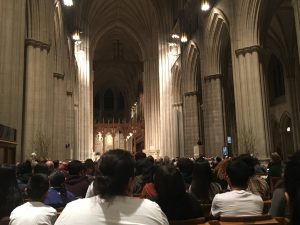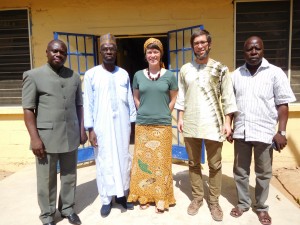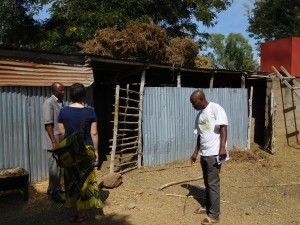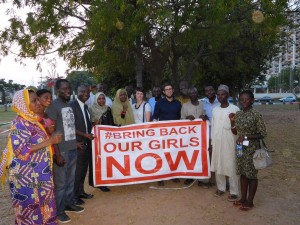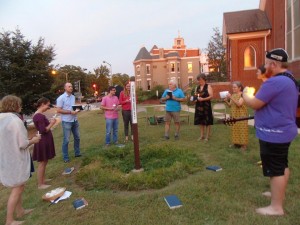Earth Day Sunday was last week. Though I wasn’t here (I’m going off the word on the street) I heard that while mentioned and in some manner included in the prayer time it was not a main theme. In the end, the point is to focus on caring for creation so timing is really not particularly essential. Better late than never.
At Christian Citizenship Seminars, this past week we focused on Native American rights focusing particularly on food security. This history of displacement and violence and broken treaties and degraded land is significant—and ongoing. Again, better late than never to focus on this and seek to listen and address this. [CCS is a youth program of the Church of the Brethren organized by Youth and Young Adult Ministries and my office—the Office of Public Witness].
The land on which this church is built is the land of the Piscataway people. Though I’ve wanted to look this up for a while. I only now just did after spending a week discussing and hearing about the experience of Indigenous peoples of this continent. I guess, at least, its better late than never.
These are related to the land (and the people of the land). For example, on the edge of the Navajo reservation sits the Lybrook Community Ministries of the Church of the Brethren. Kim and Jim Therrien are the directors and they, along with Kendra Pinto, a young Navajo protector of the land, spoke at the Christian Citizenship Seminars the past week. They told of the devastation to land by the oil and gas companies and the disregard and abandonment of the Diné people in the “checkerboard” eastern side of the reservation in New Mexico. The land and the people who know the land—whose histories and beliefs and stories of creation relate to this land—cannot be separated.
Of course, at some point it might just be too late and then it is never. So, better late than never does not eliminate urgency it simply provides a way forward in the face of much harm. For example, Cherokee attorney Joel West Williams, of the Native American Rights Fund, who also spoke at CCS told me on the taxi ride to the session that there are only around 100 Cherokee individuals who speak the language fluently and around 5 or 6 for whom Cherokee is their first language. At some point, it might be too late but for now there is at least some time. Some time to hear the call to repentance, action, and right believing.
The road to Emmaus is a narrative of an encounter with the risen Jesus. Though word had gotten out, these disciples remained perplexed. The narrative is of an encounter and of the disciples’ inexplicable inability to recognize Jesus. This unrecognition in the narrative highlights the need for God’s revelation (Craddock, Luke, 285). Jesus walks and teaches them and in retrospect they note that their hearts burned. Jesus walks and teaches them, explaining the scripture. It is not until he breaks bread that they recognize him—that he is revealed.
Now this is a telling of the revelation of the resurrected Christ to Jesus followers—and as such drawing a general lesson is a bit risky. There is significance of the sharing of the bread—as a reminder of the last supper, as the eventual practice of communion, as the simple practical act of hospitality and sharing in the basic needs of life—just the significance of this bread beckons to be extrapolated. I remember breaking bread (in the form of individually wrapped pound cakes dipped in green bean stew) with a Somali refugee in Chicago as he broke Ramadan fast in the middle of our English lesson, or Elmira the grandmother aged homeless women I’d meet in the same city and who would give the college students pizza that people gave her while sitting along the street asking for food, or breaking fry bread with a Navajo man whose ancestors were displaced by my ancestors. Hospitality and breaking bread in the face of displacement is a sign of the presence of God. It can be a revelation.
Now these breakings of bread may be too far a stretch from the Emmaus road but it does catch my imagination. Jesus is brought up out of the grave as a revelation of the power of God which then is gradually revealed to the disciples. While such revelation may be hard to spot, and in some way, is finished (since we aren’t still adding to the scriptural text), God continues to revel Godself. The revelation of the power of God continues through the work of the Spirit and the work of the community in scripture, prayer, and worship while we continue on the road of following Jesus in the work of Jesus and listening to others.
As we all know, the church has not always gotten its teaching or actions right. Because of this, care is needed in teaching, reading scripture, and discerning action. One such troubling teaching that has far reaching consequences is the “Doctrine of Discovery.” Specifically, in America there was an appropriation of the Exodus story by the European settlers. They were the Israelites escaping the slavery of England (Egypt), crossing the Red Sea of the Atlantic Ocean, to the Promised Land of the “New World,” and seizing the land from the people they found there as an act of the will of God. This misreading then continued to animate the imagination of Europeans who pushed further westward and continued to seize land through direct violence, pressure, or through manipulations of the law in their favor.
Such activity found a basis in official church teaching. The World Council of Churches in a 2012 statement notes, “For example, the church documents Dum Diversas (1452) and Romanus Pontifex (1455) called for non-Christian peoples to be invaded, captured, vanquished, subdued, reduced to perpetual slavery and to have their possessions and property seized by Christian monarchs. Collectively, these and other concepts form a paradigm or pattern of domination that is still being used against Indigenous Peoples.” (WCC, Statement on the doctrine of discovery and its enduring impact on Indigenous Peoples, Feb 17, 2012).
Creation Justice Ministries’ Earth Day Resource this year asserts that, “Because the Doctrine of Discovery is based on principles that originated with the church, the church has a special responsibility to dismantle this unjust paradigm.” (http://www.creationjustice.org/uploads/2/5/4/6/25465131/indigenous.pdf?key=63038771, 4). Now while the Church of the Brethren has never officially ascribed to this doctrine we have still benefited from the stolen lands. Most of the early Brethren were farmers and we continue to live on the land. We are not fr.ee from responsibility
While I was in New York with the high schoolers Jenn suggested that the CCS topic of Native American rights and food security and Earth Day might be good topics for the sermon. I had already begun to look that the lectionary passages for the week. Though passages did not seem particularly related to either caring for creation or the rights of Native Americans, I began to see that there were several points of connection. For one, the 1 Peter passage made an intricate argument connecting belief and action. A commentator confirmed this observation writing, “1 Peter is not alone in the NT in accenting the truth that a believer’s ‘whole life’ is a journey to heaven in the footsteps of Jesus. Yet its testimony stands as a serious caution against three popular misconceptions: that salvation is merely something that happened to Christian believers in the past, that their only responsibility now is to wait passively for the second coming and that ‘going to heaven’ is something that begins when they die” (J.R.Michaels, “1 Peter,” in Dictionary of the Later New Testament and its Developments, 922).
1 Peter 1:17-23
17 If you invoke as Father the one who judges all people impartially according to their deeds, live in reverent fear during the time of your exile. “If you invoke” in the NRSV is translated “If you call out for help” in the Message.
In the New International Version, it reads, “Since you call on a Father who judges each person’s work impartially, live out your time as foreigners here in reverent fear.”
[Exile—displacement—references the Israelites displacement from their promised land. There was a covenant by God to Abraham stating that he would be the father of a great nation. This people eventually formed into a nation but were then enslaved but then led to freedom through the power of God. They then wandered for years (40) and then went into the land that was promised. In their entering they displaced peoples and then were themselves displaced by violence and invasion. Though this narrative introduces many questions—such has “who was in the “promised land” before the Israelites?” and “What did the original peoples think about Israel’s conviction that they should enter the land?—it also is part of what “exile” references.
18 You know that you were ransomed from the futile ways inherited from your ancestors, not with perishable things like silver or gold, 19 but with the precious blood of Christ, like that of a lamb without defect or blemish. Being brought from “futile ways.” The assumption of superiority and dehumanization, exploitation, and genocide of peoples surely must count as futile. Jesus saves us from these. Though one might object and say that Peter is talking for religious practices. Because of the blood of Christ, which is pictured here as in the role of the sacrificial lamb which is part of the religious practices of the Hebrew people. Elsewhere Jesus is pictured as a priest as well as the lamb. Jesus saves us from futile ways. Jesus can yet save us from practices that continue the legacy continues environmental racism (such as in Standing Rock which protests by a white community moved construction to sacred lands and near the water of the original peoples or in New Mexico where safety measures on oil and gas companies are enforced in white communities but not on the Diné (Navajo) reservation) and the inability to acknowledge whose land this was.
22 Now that you have purified your souls by your obedience to the truth so that you have genuine mutual love, love one another deeply from the heart. 23 You have been born anew, not of perishable but of imperishable seed, through the living and enduring word of God.
Obedience to the truth results souls that have been made pure. When we realize that the Church has not only been complicit in injustice, but as with the Doctrine of Discovery, has generated teaching that spurred on the conquest and dehumanization of peoples, we should seek to repent and change our ways. The Church, thank God, has also be part of the creation of beauty, the abolition of slavery, the expansion of civil rights. So, my urging us to mine our theological and biblical resources while also interrogating them and the church’s practice is not a self-loathing or a nagging self-righteousness but a continued seeking to live in the love and will of God.
Mark Charles, a Navajo theologian and activist, argues that both the oppressed and the oppressor communities suffer from historical trauma of genocide, forced displacement, policies and practices (such as board schools) which tried to destroy culture, and dehumanization. http://wirelesshogan.blogspot.com/ .Willie James Jennings, an African American theologian and professor, asserts that the Christian imagination has been distorted. Jennings writes,
Christian social imagination is diseased and disfigured. In making this claim I am not saying that the church is lost, moribund, or impotent. Rather, I want my readers to capture sight of a loss, almost imperceptible, yet articulated powerfully in the remaining slender testimonies of Native American peoples and other aboriginal peoples. This loss points out not only to deep psychic cuts and gashes in the social imaginary of western peoples, but also to an abiding mutilation of a Christian vision of creation and our own creatureliness. I want Christians to recognize the grotesque nature of a social performance of Christianity that imagines Christian identity floating above land, landscape, animals, place, and space, leaving such realities to the machinations of capitalistic calculations and the commodity chains of private property. Such Christian identity can only inevitably lodge itself in the materiality of racial existence (Jennings, The Christian Imagination, 293).
As we seek to follow the risen Christ as a community, we as the disciples along the Emmaus road, will experience the revelation of our Lord in what are at times unexpected ways and places. As we open ourselves to hear histories and stories of the indigenous communities of this land we must both mourn the past and our complicity but more importantly we must listen and seek to end this mistreatment and injustice in the present.
-Nathan Hosler, pastor at Washington City Church of the Brethren
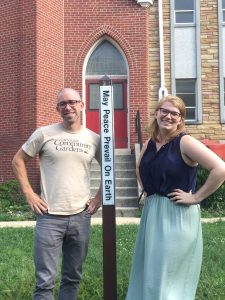



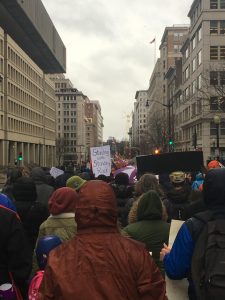 Indigenous people and allies braved the sleet and 30 degree weather in Washington, D.C. on Friday, March 10th to once again take a stand for Standing Rock. Years of work by water protectors was written away with the swipe of a pen on January 24th, when an order was presented to begin construction of the Dakota accesses pipeline, a 1,100-mile oil pipeline and Keystone XL pipeline through Indigenous land.
Indigenous people and allies braved the sleet and 30 degree weather in Washington, D.C. on Friday, March 10th to once again take a stand for Standing Rock. Years of work by water protectors was written away with the swipe of a pen on January 24th, when an order was presented to begin construction of the Dakota accesses pipeline, a 1,100-mile oil pipeline and Keystone XL pipeline through Indigenous land.